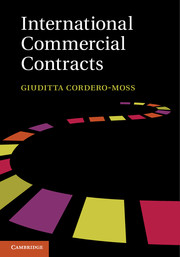Book contents
- Frontmatter
- Contents
- Preface
- Introduction
- 1 Contract practice and its expectations in terms of the governing law
- 2 The role of transnational law
- 3 The impact of the governing law
- 4 Which state law governs an international contract?
- 5 Does arbitration ensure a self-sufficient contract?
- 6 Conclusion
- Bibliography
- Index
- References
4 - Which state law governs an international contract?
Published online by Cambridge University Press: 05 June 2014
- Frontmatter
- Contents
- Preface
- Introduction
- 1 Contract practice and its expectations in terms of the governing law
- 2 The role of transnational law
- 3 The impact of the governing law
- 4 Which state law governs an international contract?
- 5 Does arbitration ensure a self-sufficient contract?
- 6 Conclusion
- Bibliography
- Index
- References
Summary
Introduction
In the previous chapters, we have shown that international contracts are ultimately subject to a state law, even if the transaction is governed by some transnational sources. The next question that has to be answered is then: which state’s law regulates an international transaction? There are rules that have the function of identifying the laws governing international relationships, the so-called conflict rules or choice-of-law rules. The area of law that regulates the choice of the governing law is called private international law (or conflict of laws). What is particularly interesting from the point of view of this book is the role of one of these conflict rules, the most important for contracts: the rule of party autonomy. This rule gives the parties the power to choose which law their contract shall be subject to. This power enhances the impression of self-sufficiency that was described in Chapter 1: if the parties are able to choose the governing law, they may be under the impression that they need not be concerned with any other law but the law of their choice. As this chapter will show, this is a misconception.
The governing law has to be identified by the conflict rules of the state where the court where the action is brought has its venue (the conflict rules of the lex fori). Each state has its own conflict rules. Some of the national choice-of-law rules are of international origin as they are contained in supranational regulations applicable in that state or in international conventions that were ratified by that state, such as, for example, the European Regulation on the Law Applicable to Contractual Obligations (Rome I) or The Hague Convention on the Law Applicable to the International Sales of Goods. Some choice-of-law rules are contained in national legislation, such as the Swiss Private International Law Act of 1987, which is a systematic codification, or the Norwegian Act on the Law Applicable to Insurance Agreements of 1992, which is an act regulating choice of law in a specific sector. Other choice-of-law rules are customary or based on judicial precedents, such as most of the Norwegian private international law is. For the purpose of predictability of the governing law, it is highly desirable that the various national conflict rules are harmonised and interpreted, to the highest extent possible, in a uniform way.
- Type
- Chapter
- Information
- International Commercial ContractsApplicable Sources and Enforceability, pp. 134 - 209Publisher: Cambridge University PressPrint publication year: 2014



